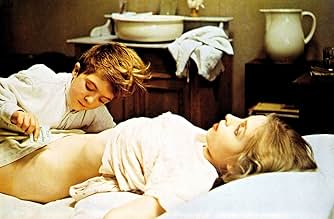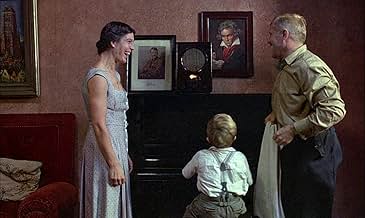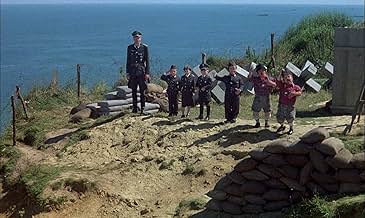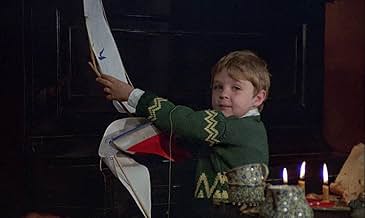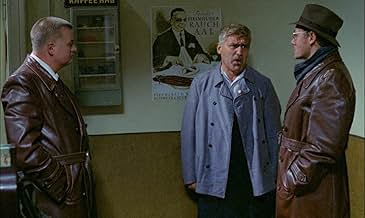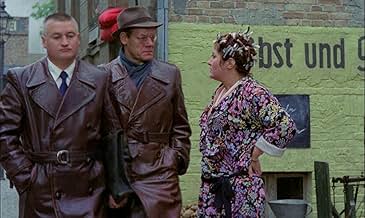En 1924, Oskar Matzerath naît dans la ville libre de Danzig. À l'âge de trois ans, il tombe dans l'escalier et cesse de grandir. En 1939, la Seconde Guerre mondiale éclate.En 1924, Oskar Matzerath naît dans la ville libre de Danzig. À l'âge de trois ans, il tombe dans l'escalier et cesse de grandir. En 1939, la Seconde Guerre mondiale éclate.En 1924, Oskar Matzerath naît dans la ville libre de Danzig. À l'âge de trois ans, il tombe dans l'escalier et cesse de grandir. En 1939, la Seconde Guerre mondiale éclate.
- Réalisation
- Scénario
- Casting principal
- Récompensé par 1 Oscar
- 18 victoires et 6 nominations au total
- Lina Greff
- (as Andréa Ferreol)
- Der Alte Heilandt
- (as Helmuth Brasch)
Avis à la une
This is very much a fantasy film. IMDb says it is a war drama, which is true enough, being set in the place and time that it is. But this is less about the war and more about Oskar, which I think makes it a fantasy film. His imagination is incredible, or perhaps more incredible is the idea that none of this is his imagination at all. His ability to alter the world around him is quite interesting.
The idea of a tin drum as a symbol of protest makes sense. It becomes even more interesting when put in the hands of a small child, protesting against life itself. Such an action is unheard of.
Goodness, what a marvel this film is! It is certainly the greatest film from Germany that I have seen yet. Winner of the 1979 Academy Award for Best Foreign Language Film, "The Tin Drum" follows the life of a boy named Oskar. After seeing how ludicrous adults act, Oskar decides to stop his growth, and stay three years old forever by falling down the stairs. He succeeds, and the fall has stopped his growth. Aside from the hault of growth, the fall eqips him with two special powers that he regularly manifests. The lesser of these two powers, is repeatedly pounding his tin drum, which he absolutely refuses to let go of. Oskar's undeniable power is to let out a high pitched shriek that will shatter any glass he directs it at. Does it sound strange? Well, the film is much stranger, but also much more beautiful than my description.
The film follows our little Oscar over a period of around two decades, through World War II in Germany. We follow Oskar through his many sexual, emotional, tragic, funny, and beautiful exploits. An absolutely important credit must be given to actor David Bennett, who plays young Oskar. He portrays Oskar as an infant, as a three year-old, as a six year-old, as a twelve year-old, as a 16 year-old, as a 21 year-old...well, you get the picture. Bennett was only 11 at the time, and his performance is very impressive.
I haven't seen very many German films from the last thirty years, but most of the ones I have seen (the excellent "Vanishing," and the immensely mediocre "White Rose") haven't had very good scores. "The Tin Drum" has a very slight, but very servicable, score by the famous Maurice Jarre. The score has an emotional theme played in only a few scenes (notably, the ending), it also has an innocent little music box theme, and surprisingly a cool waltz for scenes involving members of the circus (a big part of the second-half of the film). A very good score. To my knowledge, it was released on LP when the film was released, and on a CD pressed in Japan sometime in the 90's. I read that the (sadly out of print) Kino DVD includes the isolated score as an extra.
It's an excellent film that I strongly connected with, but I can see many people not liking it, it is VERY strange, but I am somebody who has always found VERY strange things extremely beautiful, and "The Tin Drum" is no exception. Over-all, I consider this film a classic, and I'll once again state that it is certainly the greatest film from Germany that I have seen yet.
Le saviez-vous
- AnecdotesDavid Bennent has a condition which caused him to grow very slowly. When he appeared in this film at age 11, he was 1.14 meters (3 ft. 9' in.) tall. He continued to grow to 1.55 m (5 ft. 1 in), and was still growing well into his thirties.
- GaffesWhile the German soldiers attack the Polish post office, one fires an MG42 machine gun from his shoulder. The German army didn't use that weapon before 1942. It's also not supposed to be fired while standing.
- Citations
Oskar Matzerath: There once was a drummer. His name was Oskar. He lost his poor mama, who had eat to much fish. There was once a credulous people... who believed in Santa Claus. But Santa Claus was really... the gas man! There was once a toy merchant. His name was Sigismund Markus... and he sold tin drums lacquered red and white. There was once a drummer. His name was Oskar. There was once a toy merchant... whose name was Markus... and he took all the toys in the world away with him.
- Versions alternativesAlthough reluctant to do so the BBFC were forced to remove 19 secs from UK cinema and video versions under the Protection of Children Act to remove a scene showing Oskar pressing his face against Maria's pubic region. The cuts were waived in 2003 when it was decided that the scene did not constitute an indecent image.
- ConnexionsFeatured in Pieces of Silver (1989)
Meilleurs choix
Détails
- Date de sortie
- Pays d’origine
- Site officiel
- Langues
- Aussi connu sous le nom de
- El tambor de hojalata
- Lieux de tournage
- Sociétés de production
- Voir plus de crédits d'entreprise sur IMDbPro
Box-office
- Montant brut mondial
- 7 469 $US
- Durée
- 2h 22min(142 min)
- Couleur


